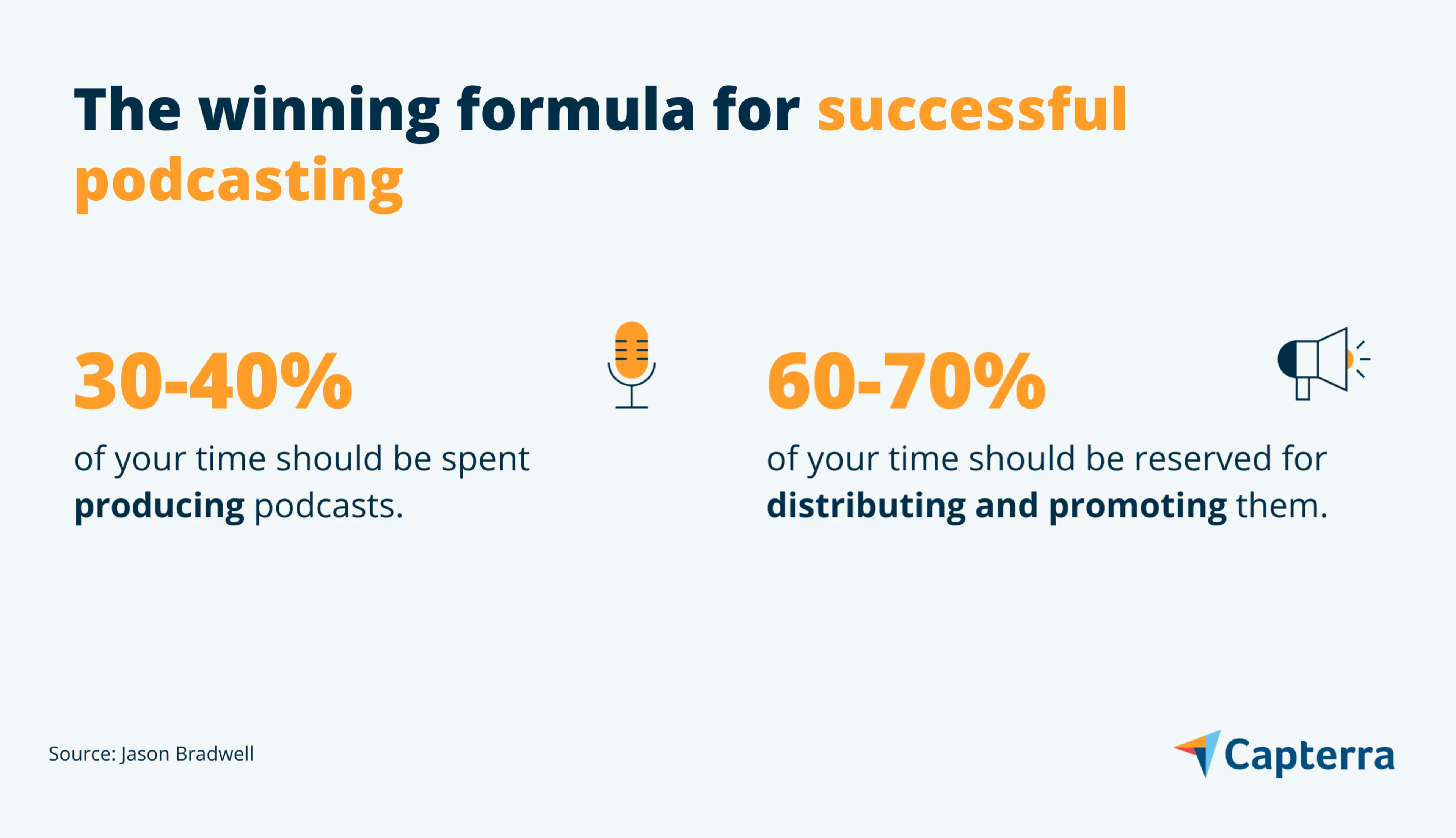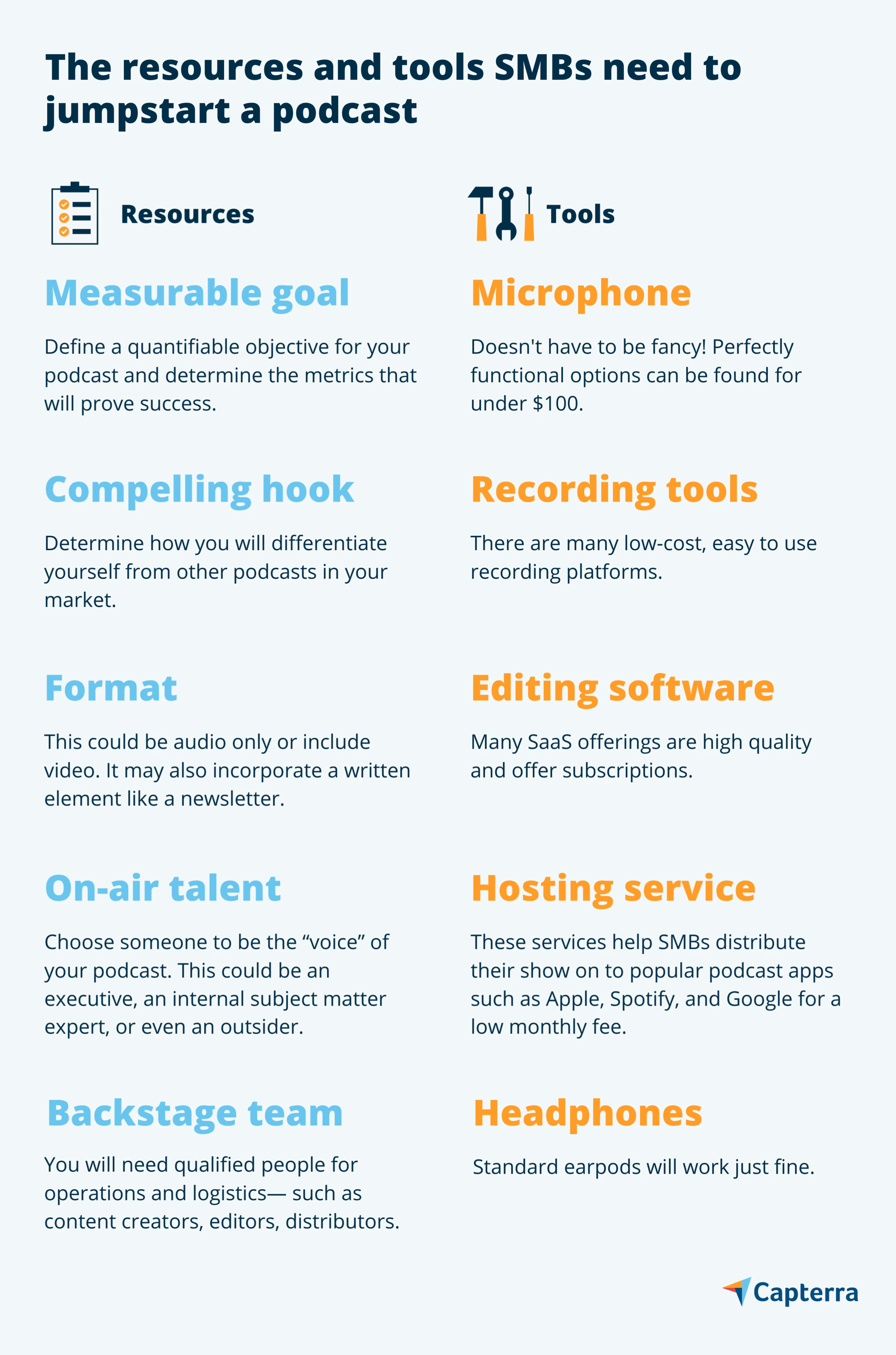Jason Bradwell shares how podcasts can help SMBs stand out in a sea of AI-generated content
What does B2B thought leadership look like in the age of AI? According to Jason Bradwell, it's podcasting—using a human voice to speak authentically to customers.
Generative AI technology may be new and exciting, but machine-generated marketing messages are not. Bradwell, host of the popular B2B Better podcast[1], says he’s rather appalled when he scrolls through LinkedIn and reads comments that were clearly written by ChatGPT or other AI engines. He calls it “commoditized content."
Instead, Bradwell advises that small and midsize businesses (SMBs) lean into the human voice.
"The most valuable asset of any SMB is not technology, not IP, but the expertise of its people."


Jason Bradwell
leading B2B marketing podcaster
Showcasing that expertise as broadly and impactfully as possible was his mission when founding B2B Better—and it should be yours, too.[2]
Podcasts, of course, are all the rage today and a great way for SMBs to reach a wider B2B audience. Podcasts can help with everything from lead generation to customer research, thought leadership, and executive profile building.
We spoke to Bradwell about everything from tactics and methods to tools and software to explore how to use podcasts to fill your sales funnel to the brim.
B2B marketing: Largely stuck in the last century
Before founding B2B Better—which produces strategic podcasts for B2B businesses to help build their brands—Bradwell spent most of his career as a marketing executive for big tech companies, focused on legacy media customers.
Most B2B companies are still doing marketing the way they did decades ago, he says. But B2B buyers have changed. They research, evaluate, and make purchasing decisions much differently today.
Although some industries may find the traditional sales-led trade show playbook still works, the tides are shifting.
That’s why investing in a human-first approach like a podcast can put a protective “moat” between you and the competition.
“You have much better defensibility of your marketing content when you're investing in either audio or video mediums,” says Bradwell.
5 best practices for B2B podcasting
The biggest mistake Bradwell sees beginning podcasters make is spending too much effort on content creation and not enough effort on promoting that content.
“Podcasts are not easily discoverable,” he says, adding that only 30% to 40% of your time should be spent producing podcasts, leaving 60% to 70% of your time for distributing and promoting them.

He offers five other guidelines for podcast success:
Establish a measurable goal. Decide what your podcast objective is. Try to define it in a way that can be quantified. If you can show metrics that tie your investment in podcasts to increased sales, that’s the best of all worlds.
Develop a compelling premise or hook. This is necessary to differentiate yourself from other podcasts in your market.
Settle on a format. This might be audio only, include video, or even have an attached newsletter that delivers written content on top of your audio (or visual) offerings.
Choose on-air talent. This person will be the voice of your podcast—perhaps a high-level executive, a subject matter expert at a lower organizational level, or even an outsider who brings knowledge and the right kind of “stage presence." Ensure this person has sufficient time to commit to regular production.
Make sure you have a solid backstage team. This means finding qualified people for operations and logistics: content creators, editors, distributors, subject matter experts, reviewers, and quality assurance approvers.
Get your tech stack together
Podcasts don’t require a huge upfront financial investment. Bradwell estimates that SMBs can launch a podcast for under $500 and advises that you don’t need professional media-grade equipment or software.
According to Capterra’s 2024 U.S. Tech Trends Report, 58% of U.S. businesses say they regret at least one software purchase made in the past 12 to 18 months. But SMBs can avoid buyer’s remorse by signing up for a free trial and thoroughly experimenting with the product before committing any funds to it.
And when using freemium products, many SMBs might well find out they’re able to operate just fine with the free version without having to upgrade—ever.
Just five pieces of technology are needed to jumpstart a podcast:
Microphone. Perfectly functional options can be found for under $100. Bradwell still uses the first one he bought for $90 when he started podcasting.
Recording tools. Bradwell says there are many excellent, low-cost recording platforms.
Editing software. Bradwell advises subscribing to one of the many high-quality SaaS offerings available.
Hosting service for storing and distributing podcasts. For a low monthly fee, a hosting service can help SMBs distribute their show on to popular podcast apps such as Apple, Spotify, and Google.
Headphones. Standard earpods (or airpods) work perfectly well.
“Of course, you can always improve the equipment—you can invest in lighting, soundproofing, or whatever upgrades you want,” says Bradwell. “But a basic tech stack like this is all you need to get going.”

Pod save the trade show
Events are a great opportunity to make the connections that generate great content, leads, and relationships. Bradwell just posted a podcast on why B2B brands fail to reap ROI from trade shows.
“Many brands go into these events with the same playbook and wonder why they don't generate any tangible ROI,” says Bradwell.
Bradwell helped a client get massive ROI from its trade show presence by recording podcasts on site at its booth. After all, Bradwell points out, where else can you find such a high concentration of high-powered potential guests?
“If you're strategic about it, you can also use podcasts as an account-based marketing tool.” - Jason Bradwell, leading B2B marketing podcaster
“Say you have prospects you’re trying to meet up with at the show. Texting or emailing them isn’t working. So you flip the script and say, ‘Hey, come to our booth and spend half an hour talking about the industry and your company and what you're seeing in your competitive space. We’ll record it and turn it into a piece of thought-leadership content, which we’ll promote for months.’ That's a completely different conversation," says Bradwell.
Rather than pitching products or services through a press release or case study, you give them something: the chance to co-create strategic content that promotes their stance and thought leadership.
In B2B marketing podcasting, keep your eye on fundamentals
When asked about any trends to help B2B marketers in strategic planning, Bradwell was adamant: “Focus on marketing basics."
To wit: What is your precise position in your market? How do you differentiate yourself from others, and what is your particular point of view about your industry and where it’s going? What pain points are your customers facing? How can you solve them?
“Having clear answers to those kinds of questions is so important, and yet so many brands fail to do it,” he says. “They get wrapped up in doing the latest marketing tactics and technology and hype. And then they’re surprised when it falls flat, and they just blend into the background because they’re doing the exact same thing as everyone else.”
As your competitors inevitably turn to AI for generating content, a podcast can help you stand out and build a B2B brand that connects people with your business.
For more ideas to take your marketing strategy to the next level, check out these insights from other industry leaders:
